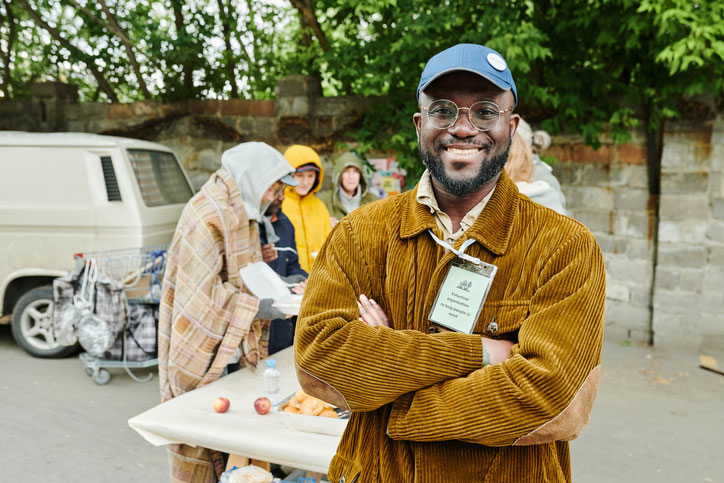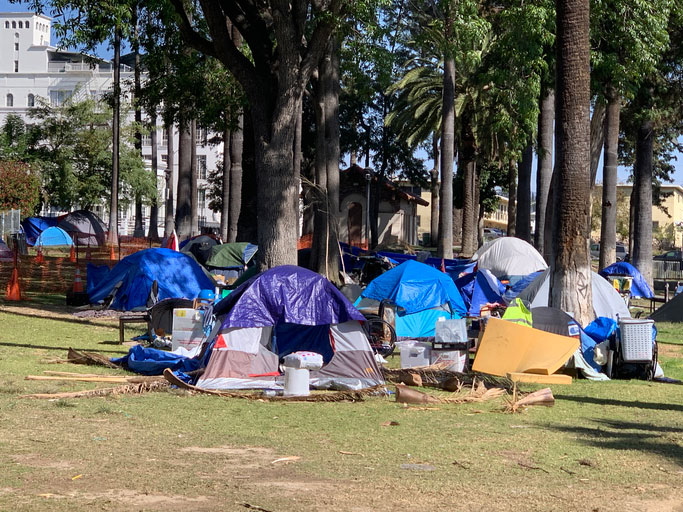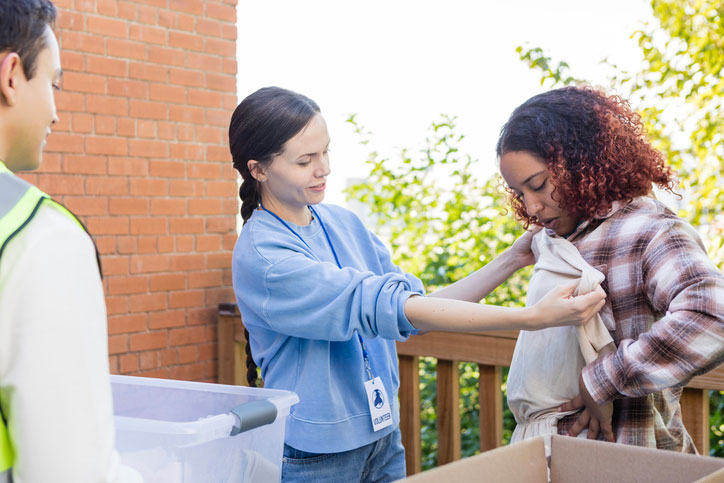Written by Scott Wilson

A Master of Social Work (MSW) is the standard education requirement for all licensed social work roles in New York State. If you’re aiming at LMSW and LCSW licensure in New York, then an MSW is definitely in your future.
Even in a broadly diverse field that spans specialty areas and serves different populations, there’s a few things that every licensed social worker in New York state has in common.
They’re tough. They’ve seen difficult situations and tragedies play out, and they want to help.
They’re motivated. They step up when other people don’t. They work tirelessly to right the wrongs of the world.
They’re compassionate. They speak for those who have no voice, feed and shelter those who otherwise go without.
Maybe most importantly, they’re trained and educated to be effective in those missions. And, in every instance, that education has come through earning a CSWE-accredited Master of Social Work (MSW) degree.
There’s no shortage of CSWE-accredited MSW options throughout the state and within the five boroughs for getting the key piece of career preparation you need to become a New York Sate licensed social worker.
And every one of them is custom built to meet the licensing requirements for one of the toughest and most important jobs in the world today. Most New York State schools of social work offer online and hybrid programs designed for working grad students exactly like you. So no matter where you live, nearly all those options are open to you.
A Master of Social Work is the Primary Qualification for LMSW and LCSW Licensure in New York

You want a first-rate graduate education in social work, so you’ve come to the right place. New Yorkers invented the whole idea of college programs for training social workers. It all started with the New York Charity Organization Society’s Summer School of Applied Philanthropy, founded in 1898. It’s still here today, carrying on a proud tradition of granting Master of Social Work degrees as the Columbia University School of Social Work.
The course of study and level of professionalism has increased in the years since 1898, but the goal remains the same: apply systematic standards of social justice to the art of helping those in need and creating systems and supports for every person to achieve their full potential.
Master of Social Work (MSW) degrees prepare graduates to take on the wide range of social challenges facing individuals and communities.
Taking one or two years to complete, these programs hand you the skills to deliver social services in all the many areas where it has become critical to modern society. They follow a prescribed curriculum plan that is an important part of earning either of the two social work licenses issued in New York State:
- Licensed Master Social Worker (LMSW)
- Licensed Clinical Social Worker (LCSW)
Those licenses, in turn, unlock almost every type of social services job anywhere in the state. From Plattsburgh to Staten Island, New Yorkers need the kind of assistance these degrees teach you how to provide.
CSWE Accreditation Assures the Quality of New York MSW Degrees
To ensure that an MSW meets the rigorous standards needed to perform those kinds of services at a high level, the state requires that programs accepted for licensure hold accreditation through the CSWE: The Council on Social Work Education’s Board of Accreditation.
If you’ve come through a BSW (Bachelor of Social Work) program, then you’re already familiar with CSWE. It’s the single specialty accreditation board for social work education recognized by CHEA, the Council for Higher Education Accreditation. That means that CSWE provides the last word on educational standards for professional social workers.
There are only 381 universities in the country that meet the tough CSWE standards for MSW accreditation; 24 of them are in New York.
Those standards are drawn up to reflect the most current experience and research in providing social services. They include core competency requirements for instructors and graduates, curriculum content, and pedagogical approaches to delivering that content.
All-in-all, they make for a program that both students and the state can count on for a quality education in social work.
New York’s two-stage approach to licensure means you need to pay attention to more than just CSWE accreditation, however. The NYSED (New York State Education Department) Office of the Professions, which handles social work licensure, further distinguishes among programs which qualify for either LMSW or LCSW status. All schools that hit the LCSW mark will work for an LMSW as well, but LMSW-only schools won’t qualify you for the LCSW.
Online MSW Programs in New York Make Sense For Busy Graduate Students

While the valuable field experience parts of modern MSW programs will require your diligent in-person attention, increasing numbers of social work degrees are being taught mostly online these days.
Naturally, this opens up the option to look at social work schools outside of New York, But even if you’re going with an in-state program, it will expand your options to any university in the state offering a CSWE-accredited MSW online.
Even relocating within New York for a year or two can be expensive. If you’re upstate and considering a downstate school, the sticker shock on room and board alone might make you pass out. Online programs solve that problem.
And if you’re like most folks coming into the field, by the time you’re heading to graduate school you’ve got a few things going on in your life that won’t let you just pick up and earn your degree anywhere —relationships, family obligations, career, kids, mortgage. None of it can be put on hold for your master’s program.
Online programs still give you plenty of opportunities to connect with professors and classmates for discussions, group projects, and guidance. But at the core of these programs is asynchronous coursework that lets you get the work done anywhere and anytime you have an internet connection.
It all adds up to give you a lot more options than traditional studies. You have more flexibility to find a school that delivers the right specializations, and practicum placements that align with your career goals.
MSW Coursework Provides a Foundation to Prepare You for Anything and the Niche Expertise You Need to Specialize

The combination of electives and required coursework you’ll take in your MSW will broaden your understanding of the socio-economic, cultural, and family dynamic factors behind many of the challenges the people of New York face, and the social services and clinical expertise it takes to help.
Master of Social Work programs are unusual in the world of graduate degrees in that they are usually modular in nature. A full course of study for an MSW takes two years if you’re starting from scratch with an undergraduate degree in something other than social work.
But MSW programs are designed to accommodate another option: they grant students who already hold a Bachelor of Social Work (BSW) advanced-standing status since the BSW fulfills the first year of an MSW. That means if you hold a BSW, you’ll enroll as an advanced-standing student and have your MSW wrapped up in as little as one year.
The best way to provide a breakdown of MSW curriculum is by looking at year one and two separately, with the understanding that BSW graduates already have year one pretty much in the bag.
The First Year of an MSW Provides the Foundation for a Career as a Licensed Social Worker
The first year, or foundation year (sometimes called the generalist year), comes with all the basic background knowledge social work requires.
That means courses in:
- Studies of human behavior and social environments
- Concepts of social justice, ethics, and social work values
- Social welfare systems, policy, and advocacy
- Basic skills in social work practice
There may also be some rudimentary coursework in performing research in social work topics to prepare you for directed research later in the program. And some schools may have more directed focus areas in the first year depending on their own philosophies or orientation in areas such as social justice.
Some New York State MSW programs build in the coursework in child abuse identification and reporting required by the state Office of the Professions for licensing.
These are basically the same type of essential foundational skills as taught in a BSW degree, which is why BSW graduates can safely skip them and qualify for one of New York’s advanced-standing MSW programs.
The Second Year Tailors Your MSW Program to the Needs of New York, and Your Own Career Goals
The second year, or concentration year, goes into more advanced and specific training toward a social work specialization.
As societal problems have increased in complexity, so has the field of social work. NASW, the National Association of Social Workers, identifies nine different specializations that are distinct enough for specialty credentials.
Each school has their own range of specializations, and they break them down in various ways.
The most traditional concentration areas are those revolving around population practices. These often include:
- Aging and Gerontology
- School
- Mental Health
- Family, Youth, and Children's Services
- Healthcare
- Immigrant and Refugee
Once you’re out working in the field, you can narrow your specialty even further with expertise in niche areas of law, mental health, psychology, and more.
Not every school will offer every one of these specialties. Others will have unique specializations that may combine or branch out from the usual offerings. Specializations in criminal justice, military social work, community organizing, labor issues, ecological justice, and other focus areas can all be found at New York schools of social work.
In other cases, you’ll have a chance to specialize in types of social work that transcend populations. These concentrations can revolve around types of treatment, like advanced clinical practice or dialectical behavior therapy (DBT), or more macro and mezzo practice areas, like leadership, social justice, policy development, or program development.
All specializations come with coursework that is unique to their practice area, but that still builds on your general foundations.
You will also have room to choose electives that can further tailor your experience. If your spur to become a social worker was seeing kids getting high on the subway, add a class in prevention and treatment of adolescent substance abuse. If a friend’s horrific breakup and abuse story shocked you, a class in intimate partner violence will give you tools to deal with such problems. Or say you have big ideas and a mind made for management—classes in administration and management practice will turn those into skills you can take to the workforce.
Dual Degrees Are a Popular Choice for MSW Students to Double Down on Complex Practice Areas

Social work mirrors society in terms of the issues it’s concerned with and the complex ways those issues intersect. That can make certain specialties really too broad to fit into an MSW program alone. Your path may need more expertise in more fields than a social work degree alone can provide.
Universities that offer CSWE-accredited MSW programs in New York know this. And so you’ll find that many MSW programs can be paired with other master’s and doctorates in dual degree programs that allow you to earn two degrees through one streamlined pathway.
This gives you a greater range of expertise while keeping your costs in check. That doesn’t mean it isn’t a lot of work—you’re taking on two graduate-level programs, and professors aren’t cutting you any slack in your assignments.
But when you come out the other side, you have a formidable set of knowledge and skills to take on injustice and inequity in almost any venue.
Popular combinations for dual MSW degrees include:
- Master of Public Health
- Juris Doctor
- Master of Business Administration
- Master of Public Administration
- Master of Education
But options range from adding a Master of Divinity to a Master of Science in Urban Planning to a Master of Arts in International Studies, depending on the university. The right combination can lay a straight path into your preferred field of practice as a social worker.
A Master of Social Work Comes With Real World Experience in New York, Even if You Earn Your MSW Online

New York requires 900 practicum hours as part of any MSW program accepted for licensure. That means it’s a sure thing that you will be placed in practical experiential training out in real world social services agencies and specialty environments that align with your focus, whether that’s at a New York City public school, a Bellevue or Mount Sinai Hospital location, or one of the New York State Veterans’ Nursing Homes.
In many programs, you’ll get a taste of this even in ordinary classes. As you study substance use disorders and rehabilitation, for example, instructors may ask you to attend an AA meeting in Queens, a DWI hearing at the Bronx Criminal Court, or participate in a field trip to an inpatient treatment facility up-state.
But MSW programs will also take you through more structured field experiences.
Practicum courses are field placements that are tightly integrated with your master’s coursework. Typically lasting only a semester, these are carefully supervised positions where you can exercise your new knowledge and skills with real clients.
Experiential learning placements in your MSW program will also usually be aligned with your specialization area, so you are practicing with the population or skills you plan to perfect for your career.
Field instructors and professors will help you integrate your experiences back into the theory you are learning in the classroom.
Many MSW programs also offer up internship opportunities later in the course of your education. These are longer and less carefully controlled than the typical practicum course. Internships are more focused on doing than observing, so you’ll work more closely within the employer’s operations and your guidance is more likely to come from staff rather than instructors. With greater responsibility and more freedom, you’ll get a better sense of the job and learn how social work happens in the real world.
Whatever Happened to the Thesis or Capstone Requirement in Master of Social Work Programs?
 Once upon a time, a master’s thesis was a bedrock requirement for graduation from any kind of master’s degree program. Running 100 pages or more, backed up by intensive research, and incorporating your own individual ideas on social work practice or concepts, these were a sign that you had truly absorbed and integrated all the coursework from your MSW program.
Once upon a time, a master’s thesis was a bedrock requirement for graduation from any kind of master’s degree program. Running 100 pages or more, backed up by intensive research, and incorporating your own individual ideas on social work practice or concepts, these were a sign that you had truly absorbed and integrated all the coursework from your MSW program.
Over time, many MSW and other practical professional degrees either sidelined the thesis or offered it as only one alternative to a professional capstone project. Capstones were more practice-oriented projects, with less writing and more emphasis on addressing real-world challenges. They are thought to offer many of the same benefits as a thesis, however.
As you browse New York state MSW degrees these days, though, you’ll notice a conspicuous absence of thesis requirements and plenty of schools that don’t even have a formal capstone requirement.
Instead, there’s a new emphasis on using practicum and research courses to accomplish the kind of integration and introspection that used to come with final projects. Instead of an all-out push at the end of your program, you’ll be expected to engage in investigation and demonstrate applications from your coursework at every stage of your master’s studies.
MSW Jobs in New York – A Master of Social Work Unlocks Jobs at Every Kind of Human Services Organization in the State

Part of the reason a master’s degree in social work is so crucial is that virtually any social work job in New York is going to require you to be licensed. And earning that license starts by earning an MSW. Even for positions that may not technically require licensure, many employers will still prefer someone with an MSW over other degrees.
The flip side of that market reality is that an MSW can qualify you for nearly any kind of social services position under the sun in New York state — everything from visiting isolated elderly residents miles from town in upstate to performing mental health assessments on Rikers inmates.
That’s a kind of diversity of daily experience that makes social work jobs for MSW grads almost impossible to define. But there are some common threads that you can count on:
- Identifying individuals and communities in crisis
- Assessing the needs and overall environment of those in need
- Directly intervening to counsel clients, obtain resources, and advocate for better treatment
- Maintain accurate case records and files
- Monitor and adjust plan as time goes along
MSW Graduates Have Risen to Highly Influential Roles in Political Leadership
 While the most natural fit for graduates with MSW degrees is a job in clinical social work itself, the kind of broad education that comes at the master’s level can qualify you for roles outside the traditional scope of social services.
While the most natural fit for graduates with MSW degrees is a job in clinical social work itself, the kind of broad education that comes at the master’s level can qualify you for roles outside the traditional scope of social services.
A hunger to do more for social justice and equality takes many MSW graduates into leadership and entrepreneurial roles. Nonprofit and governmental human services organizations are prime candidates for managers and execs with a Master of Social Work. And you can find MSW grads running hospitals, working in libraries, or consulting with human resources departments for Fortune 500 companies.
But there are many MSW grads who have come to the conclusion that the ultimate solutions to social ills come through the political process. While advocacy goes a long way, actually being able to cast a vote on critical bills, to craft key legislation, and to pull the levers for funding important social services is truly next-level social work.
So people like Barbara Mikulski, Debbie Stabenow, and Krysten Sinema have become political leaders with enormous influence throughout the country and even around the world. While it’s a long step from clinical practice, the ability to funnel millions of dollars to the right programs can do a lot for social equity, sometimes accomplishing herculean tasks in a single afternoon.
These roles can involve everything from directly serving clients at the micro level of practice to offering input on policy at the macro level. In clinical practice, you may move up to providing oversight and management for other social workers. And you might even extend your influence into other community services, using your background and training to build more just and more effective systems to support everyone in society.
Whatever path you choose, the background you establish with a Master of Social Work will help you become a powerful force for positive change in the world.
